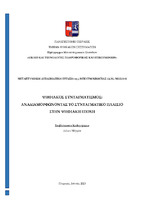Ψηφιακός συνταγματισμός : αναδιαμορφώνοντας το συνταγματικό πλαίσιο στην ψηφιακή εποχή

Προβολή/
Λέξεις κλειδιά
Ψηφιακός συνταγματισμός ; Σύνταγμα ; Ψηφιακή εποχή ; Θεμελιώδη δικαιώματα ; Δεδομένα προσωπικού χαρακτήρα ; Ελευθερία του λόγου και της πληροφόρησηςΠερίληψη
Η παρούσα διπλωματική εργασία πραγματεύεται τον ρόλο του ψηφιακού συνταγματισμού ως προς την αναδιαμόρφωση του συνταγματικού πλαισίου στο ψηφιακό περιβάλλον. Αρχικά, καταπιάνεται με τον ορισμό και τις αποστολές του ψηφιακού συνταγματισμού (Κεφάλαιο 1 & Κεφάλαιο 2). Αναλύονται οι δύο εκφάνσεις του ψηφιακού συνταγματισμού, δηλαδή η εξωτερική πλευρά του, η οποία εκδηλώνεται με κείμενα πρωτοβουλιών ανάπτυξης θεμελιωδών δικαιωμάτων στο διαδίκτυο (Κεφάλαιο 3), και η εσωτερική πλευρά του, δηλαδή η αντιμετώπιση της εμφάνισης ανεξέλεγκτων δυνάμεων στην ψηφιακή κοινωνίας από την εκάστοτε έννομη τάξη με βάση τη συνταγματική παράδοση κάθε τόπου (Κεφάλαιο 4). Έπειτα, περιγράφεται η αντίδραση του ψηφιακού συνταγματισμού -εσωτερική και εξωτερική- στις δύο μεγάλες νομικές προκλήσεις της ψηφιακής επανάστασης, δηλαδή τη συνταγματική αντιμετώπιση της ελευθερίας της έκφρασης στο διαδίκτυο (Κεφάλαιο 5) και την προστασία δεδομένων προσωπικού χαρακτήρα (Κεφάλαιο 6). Τα δικαιώματα αυτά επιλέχθηκαν επειδή έχουν αμφίδρομη σχέση. Η μελέτη αφορά κυρίως το ευρωπαϊκό πλαίσιο αντίδρασης -με αναφορά και στην ελληνική έννομη τάξη-, ανά περίπτωση συγκρινόμενο και με την αμερικανική συνταγματική παράδοση. Τέλος, ακολουθούν το Συμπέρασμα (Κεφάλαιο 7) και η Βιβλιογραφία (Κεφάλαιο 8).

